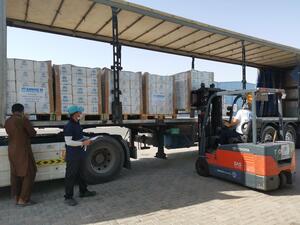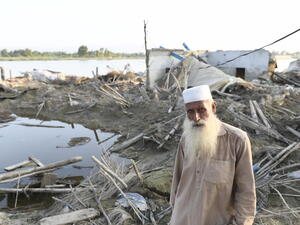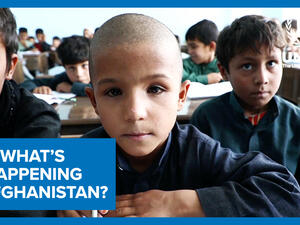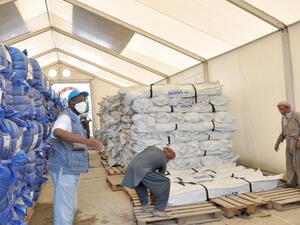UNHCR trims aid programmes as record numbers return to Afghanistan
UNHCR trims aid programmes as record numbers return to Afghanistan
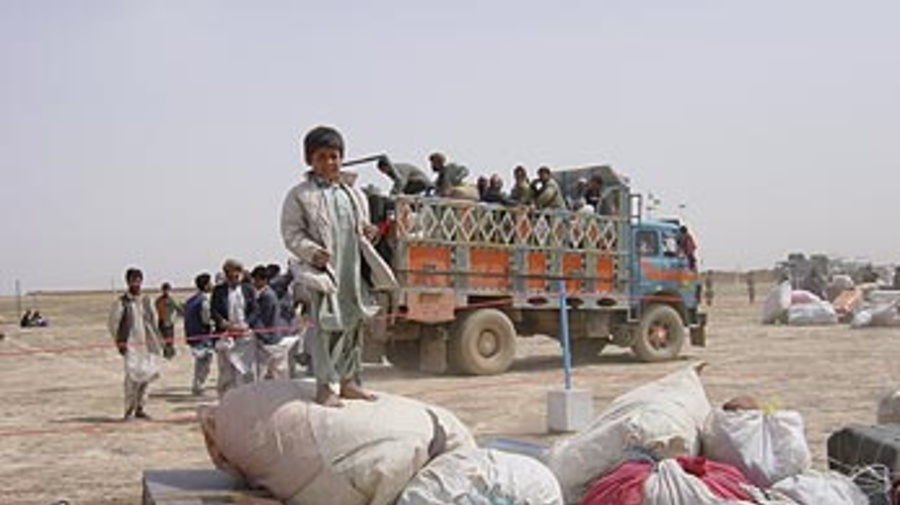
Hopes are high as Afghan returnees cross from Iran to Afghanistan at the Islam Qala border. More than 100,000 Afghans have returned from Iran since April.
KABUL, Afghanistan, July 23 (UNHCR) - With more than 1.3 million Afghan refugees back home since the start of voluntary repatriation in March, the UN refugee agency has intensified efforts to screen returnees while tightening its belt by cutting some aid programmes.
The number of assisted returns to Afghanistan surpassed 1.3 million over the weekend, including more than 1.2 million from Pakistan, three times the total expected for this year. Some 100,000 have returned from Iran, and 10,000 from the Central Asian states. UNHCR and its partners have also helped some 200,000 internally displaced Afghans back to their home areas. Another 200,000 people have returned spontaneously outside the UN initiative.
"The results to date are important," said UNHCR's Deputy Chief of Mission in Iran, Bo Schack, noting that Iran's numbers had hit 25 percent of this year's expected total. "What we have achieved is a phased repatriation in accordance with the voluntary approach agreed upon by UNHCR, the Iranian government and the Afghan Interim Authority in April."
In view of the overwhelming number of returns, UNHCR has had to revise its planning figure from 1.2 million to 2 million total returns this year. But its budget of $271 million remains unchanged. The agency has already spent more than $158 million, and is still facing a funding shortfall of $66 million.
To cope with pressing needs, the agency has had to cut non-key programmes in sectors like education and health. But it is maintaining programmes in four priority areas - protection, travel assistance, shelter and water - and channelling aid to rural areas as much as possible.
UNHCR will continue to provide travel assistance ranging from $5 to $30 for each returnee under the voluntary repatriation programme. But it has had to stop purchasing new items for returnee kits distributed to each returning family. These kits typically include plastic tarpaulins, blankets, buckets, jerry cans, hygienic material and wheat from the World Food Programme (WFP). Future kits will include only plastic sheeting and hygiene items.
To prevent possible abuse of these repatriation packages, UNHCR workers screen refugees carefully during interviews at its registration centres prior to departure.
Since the assisted repatriation programme started in March, the agency's staff have rejected over 50,000 applicants representing more than 253,000 family members who did not appear intent on remaining in Afghanistan permanently. Those rejected seemed more interested in collecting UNHCR's assistance grants, family kits and WFP food rations before trying to re-enter Pakistan.
Similarly, UNHCR staff inside Afghanistan have been scrutinising returnees before handing over assistance to better ensure that their repatriation is permanent.
Efforts to screen out false claimants have saved the refugee agency some $5 million in travel assistance, as well as the cost of 50,000 family kits and some 6,000 metric tons of WFP food aid.
Where shelter is concerned, UNHCR is focusing its programme in rural areas, where it intends to distribute some 50,000 shelter kits, often comprising wooden beams, wood for two windows, a door, nails, plastic pipes and a tool kit. This is down from a planned 97,000 kits due to belt-tightening cuts, but will still meet the needs of 400,000 people.
With only months to go before the approach of autumn - and the ensuing cold season - UNHCR plans to establish a contingency stockpile for up to 300,000 people in case some families become stranded this winter and to meet immediate needs in early 2003. With these concerns in mind, the refugee agency is especially grateful to the South Korean government for its recent donation of blankets, jerry cans, mats, soap, shoes and clothing suitable for Afghanistan's harsh winter conditions.
At the start of 2002, UNHCR put Afghan refugee numbers at 4 million worldwide. Most of the refugees are in Pakistan and Iran, but hundreds of thousands are in 70 other countries.





